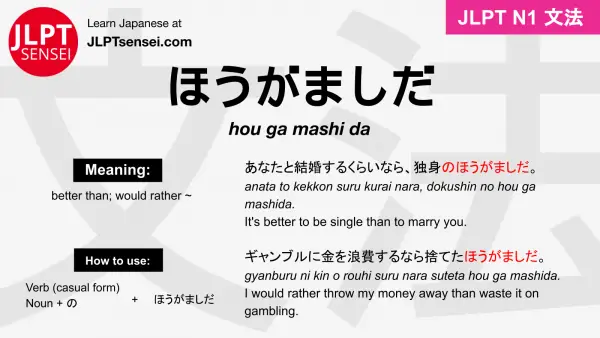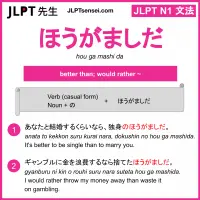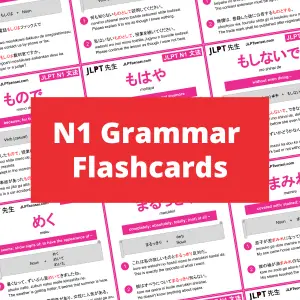Learn Japanese grammar: ほうがましだ (hou ga mashi da). Meaning: better than; would rather ~. Usually preceded with a conditional verb.
This is a grammar used to give a clear superiority or inferiority to two conflicting options based on the subjective choice of the speaker.
It is often preceded with 「~より」or「~くらいなら」.
Access ALL extra downloads, ebooks, and study guides by supporting JLPT Sensei on Patreon.
ほうがましだ - Example Sentences 例文
Each example sentence includes a Japanese hint, the romaji reading, and the English translation.
Click the below red button to toggle off and and on all of the hints, and you can click on the buttons individually to show only the ones you want to see.
Example #1
あなたと結婚するくらいなら、独身のほうがましだ。
Example #2
ギャンブルに金を浪費するなら捨てたほうがましだ。
Example #3
途中でやめるぐらいなら始めからやらないほうがましだ。
Example #4
そんな雑誌を読むくらいなら、昼寝をするほうがましだよ。
Example #5
こんな天気の中を出かけるよりは、家にいるほうがましだ。
Example #6
これを彼にあげるなら捨ててしまったほうがましだ。
Example #7
こんな苦しい思いをするくらいなら死んだほうがましだ。
View all JLPT N1 Grammar Lessons
JLPT N1 Study Guide
N1 Grammar Flashcards
Full Batch Download
Download link includes:
- Print-ready PDF of square flashcards with cut-out guides (see preview)
- Full set of high quality .png image flashcards
- JLPT N1 Grammar 文法 square size (253 images)
- JLPT N1 Grammar 文法 rectangle size (253 images)



